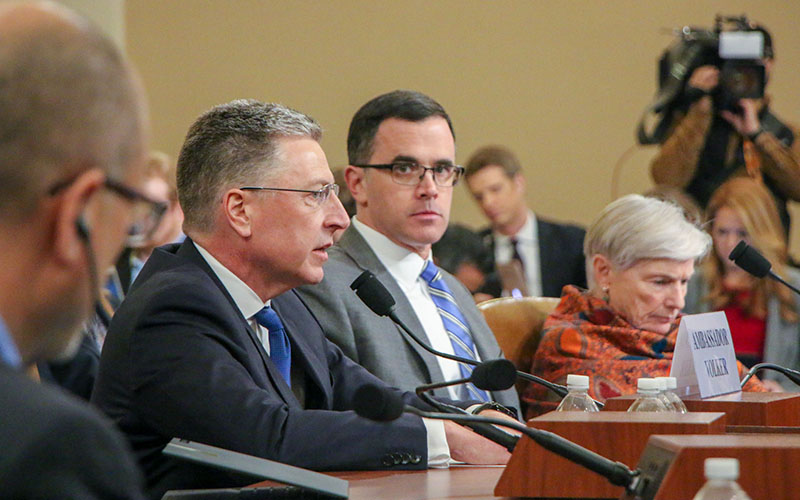
Kurt Volker, the former executive director of the McCain Institute and former U.S. envoy to Ukraine, told the House Intelligence Committee that he was not aware of efforts to get the Ukrainians to investigate the family of former Vice President Joe Biden. National Security aide Tim Morrison looks on. (Photo by Amy-Xiaoshi DePaola/Cronkite News)
WASHINGTON – Former McCain Institute Executive Director Kurt Volker told the House Intelligence Committee Tuesday that he was unaware of any efforts to get the Ukrainian government to interfere in U.S. politics in exchange for military aid.
Volker, the former U.S. special envoy to Ukraine, told the panel conducting an impeachment inquiry into President Donald Trump that his main focus was on maintaining U.S.-Ukrainian relations and that he was often “surprised” by sudden, unofficial White House moves.
“If a problem arose, I knew it was my job to fix it,” Volker said in a nine-page opening statement that laid out in meticulous detail his role as a go-between from the White House to Ukrainian officials.
Volker’s testimony came during the fourth day of open impeachment hearings into claims that Trump tried to get newly elected Ukrainian President Volodymyr Zelensky to investigate the son of former Vice President Joe Biden. Biden is considered a likely challenger to Trump in 2020.
That investigation has turned on a July 25 phone call in which Trump discusses a possible White House visit for Zelensky. But Trump asks Zelensky to “do us a favor” by investigating possible Ukrainian interference into the 2016 U.S. elections and by reopening an investigation of Hunter Biden and his role on the board of a Ukrainian energy company.
In that call, Trump criticizes then-U.S. Ambassador to Ukraine Marie Yovanovitch, who was abruptly recalled from her post in the spring, and urges Zelensky to talk to former New York Mayor Rudy Giuliani, Trump’s personal attorney, about the Biden investigation.
The White House also withheld millions in military aid to Ukraine over the summer without an official explanation, although that money was later released.
Volker, who had been called by Republicans on the Intelligence Committee to testify, the accusations against Biden and his son’s business dealings in Ukraine “not credible” and a “conspiracy theory” pushed by Giuliani.
“I have known Vice President Biden for 24 years,” Volker said. “He is an honorable man and I hold him in the highest regard.”
Volker said his focus was to maintain strong ties to Ukraine as a key to “reversing Russian aggression” in the region and around the world. But he said those efforts were stymied by Trump’s perception that Ukraine was “a corrupt country, full of terrible people,” a narrative he said was fueled by Giuliani. Volker and other witnesses have repeatedly said the landslide election of Zelensky, a reformer, proves that is no longer the case.
In closed-door testimony to the committee on Oct. 3, at the outset of the impeachment inquiry, Volker said he did not listen in on the July 25 call and was not aware of Biden’s name being mentioned until after a transcript of the call was released.
-Cronkite News video by Bryan Pietsch
He said Tuesday, however, that he did hear European Union Ambassador Gordon Sondland make a “generic comment about investigations” during a July meeting with national security officials, which Volker and the officials thought “inappropriate.”
Volker also said he was not aware of a link between Biden and Burisma, the Ukraine-based energy company that had Hunter Biden on its board, and did not know of other discussions through “unofficial” channels pressuring the Ukrainians for investigation.
When Rep. Sean Patrick Maloney, D-N.Y., wondered why Volker was “out of the loop” on the Ukrainian negotiations, Volker defended himself.
“I have learned many things I did not know at that time,” he said, pointing back to his opening statement, and referring to the official and unofficial channels that were sending differing messages to the Ukrainians.
The strategic importance of Ukraine was echoed by another witness, Timothy Morrison, a Europe and Russia expert for the National Security Council. Morrison told the committee Tuesday that U.S. relations with Ukraine are essential to standing between “the West and Vladimir Putin’s revanchist Russia.”
When Democrats on the committee asked Volker and Morrison why they did not report the phone call that they considered “inappropriate,” and take their concerns up the chain of command, Morrison said he feared at the time “how its disclosure would play in Washington’s political climate. My fears have been realized.”
Volker and Morrison followed morning testimony Lt. Col. Alexander S. Vindman, Ukraine expert for the NSC, and Jennifer Williams, an aide to Vice President Mike Pence, who both raised concern about the July 25 call. Previous witnesses included Yovanovitch and State Department officials who testified to their concerns over Giuliani’s role in what they saw as inappropriate demands on the Ukrainians.
The committee is scheduled to hear tomorrow from Sondland; Trump’s Deputy Assistant Secretary of Defense for Russian, Ukranian, and Eurasian Affairs Laura Cooper; and Under Secretary of State for Political Affairs David Hale.
They are part of a hectic seven weeks of hearings that began behind closed doors on Oct. 3 with Volker as the first witness testifying to the House Intelligence, Foreign Affairs and Oversight committees.
Volker resigned from his position with the McCain Institute on Oct. 7, saying the media focus on his testimony would distract from the work of the institute, which is affiliated with Arizona State University.
ASU President Michael Crow said then that Volker would be on “paid administrative leave … until further notice.” An ASU spokeswoman said Tuesday that Volker remains on paid leave, and declined further comment.